Related Research Articles

"Someday We'll Be Together" is a song written by Johnny Bristol, Jackey Beavers, and Harvey Fuqua. It was the last of twelve American number-one pop singles for Diana Ross & the Supremes on the Motown label. Although it was released as the final Supremes song featuring Diana Ross, who left the group for a solo career in January 1970, it was recorded as Ross' first solo single and Supremes members Mary Wilson and Cindy Birdsong do not sing on the recording. Both appear on the B-side, "He's My Sunny Boy".

"My Girl" is a soul music song recorded by the Temptations for the Gordy (Motown) record label. Written and produced by the Miracles members Smokey Robinson and Ronald White, it became the Temptations' first U.S. number 1 single, and is today their signature song. Robinson's inspiration for writing "My Girl" was his wife, Miracles member Claudette Rogers Robinson. The song was included on the Temptations 1965 album The Temptations Sing Smokey. In 2017, the song was selected for preservation in the National Recording Registry by the Library of Congress as being "culturally, historically, or artistically significant".
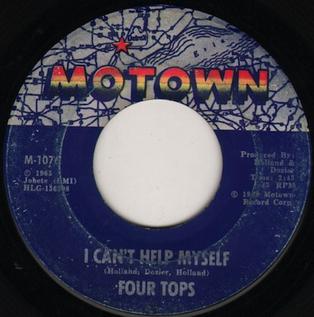
"I Can't Help Myself " is a 1965 hit song recorded by the Four Tops for the Motown label.

"I'll Be There" is the first single released on Third Album by The Jackson 5. It was written by Berry Gordy, Hal Davis, Bob West, and Willie Hutch.
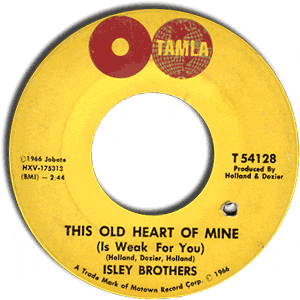
"This Old Heart of Mine " is a Holland–Dozier–Holland song by American musical group the Isley Brothers that was a hit for them in January 1966 during their brief tenure on Motown's Tamla label. Featuring Ronald Isley on lead vocal, "This Old Heart of Mine" peaked at number twelve on the Billboard Hot 100, and at number six on the Billboard R&B Singles chart.
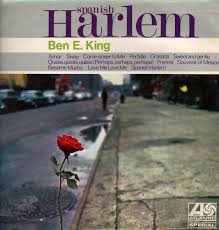
"Spanish Harlem" is a song recorded by Ben E. King in 1960 for Atco Records. It was written by Jerry Leiber and Phil Spector and produced by Jerry Leiber and Mike Stoller. "Spanish Harlem" was King's first hit away from The Drifters, peaking at number 15 on Billboard's rhythm and blues and number 10 in pop music chart.

"Three Times a Lady" is a 1978 song by American soul group the Commodores for their album Natural High, written by lead singer Lionel Richie. It was produced by James Anthony Carmichael and the Commodores.

"Sherry" is a song written by Bob Gaudio and recorded by The Four Seasons.

"I'll Take You There" is a song written by Al Bell, and originally performed by soul/gospel family band The Staple Singers. The Staple Singers version, produced by Bell, was released on Stax Records in February 1972, and spent a total of 15 weeks on the charts and reached #1 on the Billboard Hot 100. It is ranked as the 19th biggest American hit of 1972.
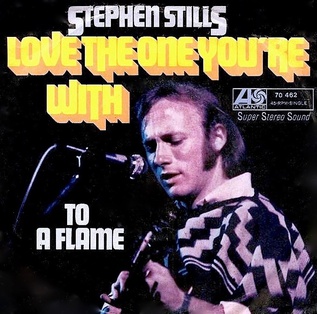
"Love the One You're With" is a song by folk rock musician Stephen Stills. It was released as the lead single from his debut self-titled studio album in November 1970. The song, inspired by a remark Stills heard from musician Billy Preston, became his biggest hit single, peaking at No. 14 on the Billboard Hot 100 in early 1971. David Crosby and Graham Nash, Stills' fellow members of Crosby, Stills & Nash, provide background vocals on the song. The song was also covered by a number of artists, notably the Isley Brothers, The Meters, Bucks Fizz, Luther Vandross and Richard Clapton.

"Something He Can Feel" is a song composed by Curtis Mayfield for the 1976 motion picture Sparkle. The song, a love ballad in a Chicago-/Philly-soul style, became a number-one hit on the Billboard's R&B singles chart in the United States twice with two separate recordings: a 1976 version by Aretha Franklin from the film's soundtrack, and a 1992 cover by girl group En Vogue.
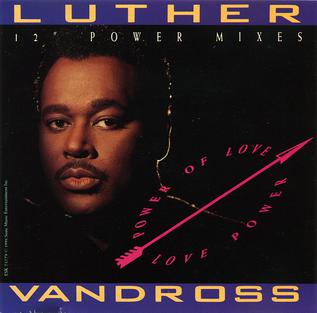
"Power of Love/Love Power" is a single by American singer-songwriter Luther Vandross. It was released on April 9, 1991 as the lead single from his 1991 album of the same name. The hit song spent two weeks at number one on the US R&B chart, and peaked at number four on the US pop chart, becoming his biggest pop solo hit.

"Floy Joy" is a song written by Smokey Robinson and released as a single in December 1971 by popular Motown female singing group The Supremes.

"I'll Be Around" is a song recorded by the American R&B vocal group The Spinners. The song was co-written by Thom Bell and Phil Hurtt and produced by Bell.

"Automatically Sunshine" is a song written by Smokey Robinson and released as a single by Motown singing group The Supremes as the second single from their popular album Floy Joy in 1972.

"Everybody's Got the Right to Love" is a socially conscious–inspired pop song written by Lou Stallman, produced by Frank Wilson and released as a single in 1970 by Motown group The Supremes, who took the song into the top forty in mid-1970 following the release of "Up the Ladder to the Roof".
"The Door Is Still Open to My Heart" is a 1955 song written by Chuck Willis and originally performed by the Baltimore-based R&B vocal group, The Cardinals. In the US, the original version peaked at number four on the R&B playlist and number ten in R&B sales charts. Later in 1955, Don Cornell recorded the song and released it as the B-side to his hit, "Most of All". The Hilltoppers had a moderate hit with this song the same year.

"Where Did Our Love Go" is a 1964 song recorded by American music group the Supremes for the Motown label.

Prince released several hundred songs both under his own name and under pseudonyms and/or pen names, as well as writing songs which have been recorded by other artists. Estimates of the actual number of songs written by Prince range anywhere from 500 to well over 1,000. He has released 97 singles, 34 promotional singles, 21 internet singles, and eight internet downloads.
References
- ↑ White, Adam; Bronson, Fred (1993). The Billboard Book of Number One Rhythm & Blues Hits. New York: Billboard Books:Watson-Guptill Publications. p. 141.
- ↑ "RPM Top 100 Singles - August 10, 1974" (PDF).
- ↑ Whitburn, Joel (2004). Top R&B/Hip-Hop Singles: 1942-2004. Record Research. p. 272.